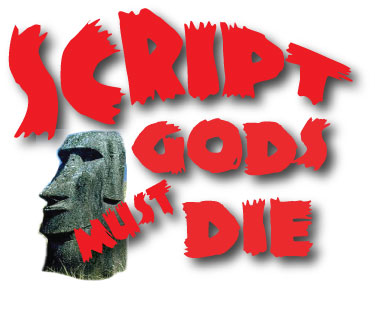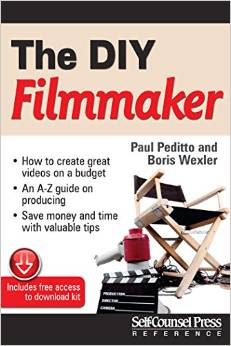Script Gods Must Die?
Good Reader, let me tell you what you’ll find here, and who the hell I, your Humble Narrator, am.
Script Gods Must Die will be a place of teaching.
I will never bullshit you. If I try such heresy, I expect you to call me on it, toot-freakin’-sweet.
What can be said about screenwriting that hasn’t been said already? Why add to the compost heap of ten-thousand blogs and websites already out there?
No doubt you can, and should, learn about moviemaking from the likes of Peter Jackson or Christopher Nolan. It’s always best to study from the best. But you can also learn from the Alan Smithees of the world—the terrifying object lessons of what not to do!
Thus we come to me, your very own Alan Smithee, and my contribution to the world of cinema.
Object Lesson 1: Don’t screw up your first movie. You may never get another chance.
Yeah, I’m that guy. Drove my Chevy to the Levee but the Levee was dry.
I wrote and directed Jane Doe. Six months after its release, Calista Flockhart became Ally McBeal. The film was submitted to only one festival (and won it) but never got a theatrical release, nor a single review. Yet here, as if by divine will, it was popping up on Inside Edition and Entertainment Tonight. When the DVD came out, it was four across at every Blockbuster and Hollywood video in the country.
With this “heat” came possibilities. William Morris, meetings. Scripts pitched and optioned to major producers and development people. Horseshoes and hand grenades.
For a multitude of reasons, even though Jane Doe went on to gross well over a million dollars, it wasn’t the breakthrough movie a first-time writer/director dreams about; some of that might be due to the fact I had, incredibly,never stepped on a movie set. I was clueless about the process—the machinations of what it takes to actually make a movie.
Thus is born this blog. And the simple thought that maybe I can help some people.
Since Jane Doe (which was a pretty good play) there have been optioned screenplays, Nicholl Fellowship and Slamdance semifinal scripts, published plays, a book, multiple short films and webisodes. The last several years I’ve been a script consultant and screenwriting instructor at Columbia College and Chicago Filmmakers. That’s some of who I am.
Truth be told, I’m more interested in you.
How would you describe yourself as a writer?
Maybe you’re like many of my Chicago students: You have an idea. You’ve never written a screenplay. You thought you might take a stab at writing a movie. But how? You’ve got no clue what it looks like, or what to do.
You go online, punch in “screenwriting,” and damn! 10,222 cookie-cutter sites, so damnnnn preeety! All that bland information, the Same Old Shit from gurus and self-appointed Script Gods. “Write compelling characters!” “Tell personal stories that matter!” You spend an hour surfing and come away with a migraine. Write compelling characters?! Great—how the hell do you go about doing that?!
Oh, of course…
Buy the guru’s book.
Sign up for the guru’s online class.
Sign up for his traveling one-day $300 comprehensive seminar, coming soon to a city near you!
Send the script in and pay $400 for the guru’s “comprehensive evaluation.”
Industries upon industries built on you, Good Reader, and your desire to tell a story. They prey upon you, your desire to get into the game. Truth is: Almost none of the gurus are in the game themselves. Look up their credits on Google or IMDB to find the reality.
Writing for film is equal parts art and craft. The craft—format, structure, character development—can be taught. For you “beginners,” Scripts Gods Must Die will take a stab at each of these, and help answer some questions you have on basics.
For the “advanced” writers—what exactly does that mean?
You’ve written a script (or 10) and sent it (them) out to varying degrees of success. No breakthroughs, but there’s been “movement.”
Or maybe you’ve had zero movement, and you’re pissed off. It’s ok to admit that!
Any of the following scenarios sound familiar?
- You placed quarterfinals at the Southwest by Southeast Panhandle State Screenwriting Competition. They claimed industry pros would read your script but you haven’t heard back yet.
- You sent out query letters and got a response from producer Rod Blagogovitch. His GotaGuy Prodco is located somewhere in Encino. You sent out the script with a $100 “reading fee” but haven’t heard back.
- Your pitch for Stay Puff Marshmallow Man In Montana was well-received at Pitchfest. A junior agent at William Morris was interested enough to give you his card. You phone him, but the calls go unanswered. You follow up with emails, nothing. You don’t want to come across like a stalker so you wait for the agent to respond. It’s been three months…
Can I tell you: The agent did respond.
Hollywood rejection sounds like this:
…………………………………………………………………
Silent. Economical. Perfect.
You keep waiting for news, hoping something will break. What the hell else are you gonna do? And this is the $64,000 question: What can you do about it?
How about controlling what you can control?
How about being proactive?
How about not waiting for the phone to ring?
How about making something happen.
But how? You’ve read all the books and blogs; you took classes and seminars; you went to the cattle-calls at Pitchfest, even shelled out $300 for Screenwriting Expo 5…
Consider today’s thought from the sales department:
A customer will do what they do, until the pain of doing it becomes unbearable.
Or this thought, from The Sage:
Lessons are taught until they are learned.
There is an angle, something you haven’t thought about yet. There is a way. When they told you at Pitchfest nobody is looking to buy your character-driven, deeply heartfelt and personal drama inspired from your very own grandpa and his days as a catfish noodler, what did you do? Did you crumble? Did you even finish the script? Welcome to Darwinism, Hollywood-style.
The Pitchfest finochio goes back to his gig at Smores, Buttcheek and Jones… and you? You toss in. You give up. Maybe it wasn’t meant to be. Writing is a pain in the ass. Not to mention the chances of your script turning into Slumdog Millionaire, Juno, Little Miss Sunshine are about as likely as you winning the Illinois Powerball Jackpot.
Object Lesson 2: If I can get my movie made, you can make yours.
That is my message to you, Good Reader.
You might be the genius in the crowd. You might not. Let’s say we find out. Read Script Gods Must Die, see if there’s learning here.
Vamos!

